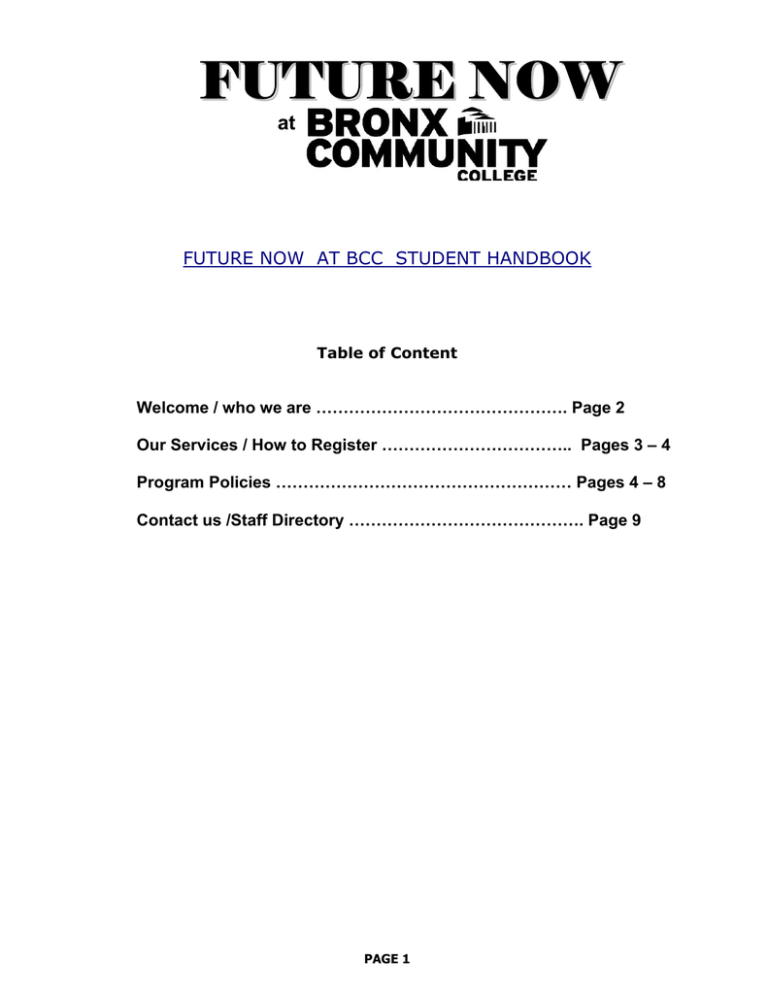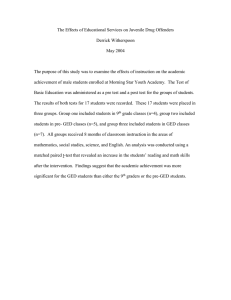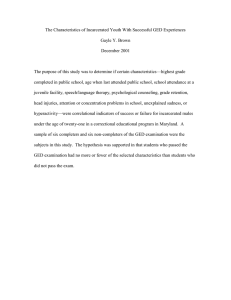
FUTURE NOW
at
FUTURE NOW AT BCC STUDENT HANDBOOK
Table of Content
Welcome / who we are ………………………………………. Page 2
Our Services / How to Register …………………………….. Pages 3 – 4
Program Policies ……………………………………………… Pages 4 – 8
Contact us /Staff Directory ……………………………………. Page 9
PAGE 1
FUTURE NOW
WELCOME!
Welcome to the FUTURE NOW Program at Bronx Community College. FUTURE NOW is an educational
program which helps young adults to create successful futures using Dr. Cal Crow’s philosophy about learning and
motivation. We believe everyone wants to be a success and our goal is to help young people learn how to become
successful in legal, healthy ways.
FUTURE NOW believes that everyone is born with the potential for success, but may not know how to
identify and use it. Our goal is to help young people learn how to uncover their hidden strengths, skills and talents
and use them to create successful futures. We firmly believe that we get what we focus on. For this reason we
emphasize the positives, knowing that it will eliminate most of the negatives. We help young people learn how to
view their lives form an appreciative, strengths-based, positive perspective. In this manner our students learn how
to create “success identities” in the classroom and in their communities.
Our program believes that everyone has a place (or places) in the community, and in the world-at-large,
although many who feel alienated or marginalized do not necessarily share this belief. We strive to help young
people learn how to “find their place(s)” and how to feel competent, confident and connected. The FUTURE
NOW program is about young people’s minds (content), their heart (feelings) and their soul (meaning). It is a place
for students to identify and develop their strengths, skills and talents and to plan and prepare for a successful future.
WHO WE ARE
The mission of FUTURE NOW at Bronx Community College (BCC) has always been to provide our
participants with educational and vocational development and empowerment. BCC is located in the west central
Bronx, the home community of a large number of disenfranchised youths. FUTURE NOW at BCC offers free
GED and vocational training classes, counseling and career exploration, along with college enrollment services to
about 500 students per year. These on-campus classes and services have proved to be an ideal place for
“mainstreaming” out-of-school adolescents, offering them an opportunity to identify with a new group of striving
young adults, and to gain the skills and access to the labor market necessary to become productively employed.
Thanks to the collaborative efforts of the City University of New York and the Department of Education,
FUTURE NOW at BCC has surpassed its objectives every year. In the last five program years, 449 students have
received GED diplomas and 533 students have enrolled in college at BCC.
PAGE 2
1. OUR SERVICES
A. GED Preparation Classes – Career Education Center
Our program offers free GED preparatory classes through the Department of Education’s GED PLUS for
students ages 17-21. The GED classes are an opportunity for students to move ahead in their education, to explore
their abilities, and to plan their careers. They are also an ideal place for students to acquire the behaviors necessary
to succeed in college and in the job place. The successful completion of the classes and the attainment of the high
school equivalency diploma are the first step to college placement and employment. The average length of time our
students spend to obtain the GED is about three months; however this is largely dependant on the student’s level
of motivation, determination and attendance. Many of our students have obtained their GED diplomas in the
course of one month while others have done so over the course of one year.
Valuable Information Regarding the GED Examination:
Students, it is helpful to remember that the GED Tests are a rigorous battery of five tests that take more
than seven and a half hours to complete in two days. Regardless of your ability, you will be more certain to perform
your best on the tests if you know what to expect before the testing day arrives and if you study and attend classes
every day, participate and take notes in class. Furthermore, if you organize your time to allow you to study regularly
at home , library or some other comfortable space where you will read and practice the skills for the GED Tests,
this will improve your readiness. Students must try to avoid any distractions and try to get support from their family
and friends to help them concentrate on their work.
. Once every month, the teacher will administer Official GED Practice Tests (Predictors) which are
designed to evaluate your readiness to take the full-length GED Tests. These Practice Tests include half of the
number of questions found on the GED Tests and they include sample questions that cover the knowledge and
skills. The teachers will use the results of the Official GED Practice Tests to determine if you are ready to be
scheduled for the official GED Tests. In order to be recommended for the GED Tests, you must score an average
of 470 on each subject – with a total score of 2,500. This requirement takes into consideration that the Official
Practice tests contain fewer questions than the full-length GED Tests. What is also important is that the results of
the Practice Tests will help you and the teachers get a sense of your weaker subject areas for further practice and
study. 99.9% of our students who have passed the Official GED Practice Test have passed the GED examination.
B. College Enrollment
FUTURE NOW participants are enrolled in college immediately after they receive their High School
Equivalency Diploma (GED). They are enrolled in Bronx Community College or another two-year City University
of New York college of their choice. City University of New York (CUNY) is the largest educational institutions in
the world. It is made up of 25 colleges all of which are located in Manhattan, The Bronx, Queens, Brooklyn, and
Staten Island. The colleges offer approximately 1,400 academic programs, more than 200 majors leading to associate
and baccalaureate degrees, and more than 100 graduate degree majors. Students in possession of a GED or a high
school regent diploma are guaranteed admission into CUNY.
The FUTURE NOW staff at Bronx Community College assists students working on their GED (and those
who already have it) with college enrollment by filling-out student’s college and financial aid forms at our offices,
and then submitting them to the BCC admissions and financial aid offices. We also administer personality and
career aptitudes tests to students to assist them in choosing a major that will best match their skills, strengths and
talents. For a list of majors available at Bronx community college, click here:
http://www.bcc.cuny.edu/DegreePrograms/DegreePrograms.cfm
c. Vocational Training – Henkels and McCoy Career Connections
Henkels & McCoy (H&M), a nationwide utility construction, engineering and training services corporation,
has partnered with FUTURE NOW at Bronx Community to provide employability and computer skills training for
students ages 19-21. The program offers alternative learning methods such as their “build-to-keep” component. A
PAGE 3
key component of this program is that each participant assembles a state-of-the-art computer and after meeting preestablished goals, the student is allowed to keep the computer he/she built.
H&M also offers Job placement services to participants upon request. Placement sites are determined based
on the participant’s educational attainment and interests. All participants receive continuing services and support
while employed.
3. HOW TO REGISTER
To be eligible for the program, students must be between 17 and 21 years of age. Each student who is
interested in enrolling in the FUTURE NOW GED Program is scheduled for a placement testing session. Students
who possess their GED or high school diploma and who are interested in enrolling in college are given an
appointment with a counselor who is responsible for completing and reviewing their college admissions package.
A. Prospective GED Students Testing, Interviewing and Orientation Procedures
Students who successfully complete the GED placement examination (TABE exam) are contacted by a
FUTURE NOW counselor who schedules him/her for an individual interview. The individual interviews are
designed to measure student’s level of motivation and their suitability for the program. Students who successfully
complete their individual interviews are then instructed to return two days later for orientation. GED classes
normally begin 3 days after students have attended orientation.
B. Prospective College Students Admissions, Testing and Registration Process
Students, whose college admissions package is submitted to admissions, receive a college acceptance
package which contains: a congratulations letter acknowledging their acceptance to the college; a check-list detailing
submitted documents and/or requesting documents that were not submitted; a date, time and place for the CUNY
entrance exam. Upon completion of the CUNY entrance exam, students receive a registration permit in the mail
which allows them to register for college courses. Incoming freshman are referred to a college advisor who has
access to their CUNY test scores and who assigns them to college classes in accordance with their scores.
C. All FUTURE NOW students ages 19-21 are eligible for the Henkels and McCoy computer training and
employability program.
4. PROGRAM POLICIES
A. Students’ Rights
The goal of the FUTURE NOW program is to foster a sense of mutual respect among students and staff
for the good of all concerned. The cooperation of all members of the school community will ensure that a rich
learning experience and educational excellence can be achieved for every student. All students are guaranteed the
right to express opinions, support causes, organize and assemble to discuss issues. Every student has the right to be
treated fairly in accordance with the rights set forth in this document. In addition, as a student in the FUTURE
NOW Program, you have a right to:
•
be in a safe and supportive learning environment, free from discrimination, harassment and bigotry;
•
receive courtesy and respect from others regardless of age, race, creed, color, gender, religion, national origin,
sexual orientation, disability, culture and political beliefs;
•
receive a written copy of your rights and responsibilities as a student as well as the program's rules, regulations,
penalties, attendance, academic and other policies and procedures, early in the school year or upon admission to the
program;
•
be informed about the General Educational Diploma (GED)Tests and GED Practice Tests requirements and
information on assistance by the program courses and other activities to meet those requirements;
PAGE 4
•
be informed about required health, high school and other documents ;
•
receive professional instruction in the FUTURE NOW classes;
•
know the grading criteria for each subject area and/or course offered by the program and to receive grades for
school work completed based on established criteria;
•
be informed of educational progress and receive periodic evaluations both informally and through formal
progress reports;
•
access to review your education records in the program upon request. The right to review your records is always
accorded to your parent/guardian if you are under the age of 18.
•
confidentiality in the handling of your student records maintained by the program;
•
receive guidance, counseling and advisement for personal, social, educational, career and vocational
development;
•
be represented by your peers in disciplinary actions;
•
Publish school newspapers and school newsletters reflecting the life of the school and expressing student
concerns and points of view consistent with responsible journalistic methods and subject to reasonable regulations.
The publications must not be obscene or cause substantial disorder or invade the rights of others.
•
wear political or other types of buttons, badges or armbands, except where such material is obscene or causes
substantial disorder or invades the rights of others;
•
be secure in your person, papers and effects and to carry in the school building personal possessions which are
appropriate for use on the premises;
•
be free from unreasonable or indiscriminate searches, including body searches;
•
be aware that corporal punishment is prohibited;
•
know what is appropriate behavior and what behaviors may result in disciplinary actions;
•
be counseled by members of the program staff in matters related to your behavior as it affects your education
and welfare within the program;
•
receive written notice of the reasons for disciplinary action taken against you in a timely fashion;
•
due process of law in instances of disciplinary action for alleged violations of program regulations for which you
may be suspended or removed from class by your teachers;
•
know the procedures for appealing the actions and decisions of school officials with respect to your rights and
responsibilities as set forth in this handbook;
•
be accompanied by parent/adult in parental relationship and/or representative at conferences and hearings;
•
the presence of school staff in situations where there may be campus security or police involvement; and
•
Answer or explain in writing any material entered in your student records.
You or an invited guest has the right to advocate positions without having to fear abuse, physical, verbal, or
otherwise, from others supporting conflicting points of view.
PAGE 5
B. Student Responsibilities
Responsible behavior by each student is the only way in which the rights set forth in this document can be
preserved. Violation of some of these responsibilities may lead to disciplinary measures. Students have a
responsibility to:
• attend classes regularly and punctually and make your best effort to achieve in all areas of your education;
•
be prepared for class with appropriate materials and completed homework;
•
help maintain a school environment free of weapons, illegal drugs, controlled substances and alcohol;
•
behave in a manner that contributes to a safe learning environment and which does not violate other students’
right to learn;
•
share information with school officials regarding matters which may endanger the health and welfare of
members of the school community;
•
respect the dignity and equality of others and refrain from conduct which denies or impinges on the rights of
others;
•
show respect for school property and respect the property of others, both private and public;
•
be polite, courteous and respectful toward others regardless of age, race, creed, color, gender, religion, national
origin, sexual orientation, physical and/or emotional condition, disability, political beliefs, and refrain from making
slurs based on these criteria;
•
use non-confrontational methods to resolve conflicts;
•
work with school staff in developing broad extracurricular programs in order to represent the range of physical,
social and cultural interests and needs of students;
•
observe ethical codes of responsible journalism;
•
refrain from obscene and defamatory communication in speech, writing and other modes of expression in your
interactions with the college community;
•
express yourself in a manner which promotes cooperation and does not interfere with the educational process;
•
bring to school only those personal possessions which are safe and do not interfere with the learning
environment;
•
be familiar with the school discipline code and abide by school rules and regulations;
•
provide leadership to encourage fellow students to follow established school policies and practices;
•
Keep parents informed of school-related matters, including progress in school, social and educational events,
and ensure that parents receive communications which are provided by school staff to students for transmittal to
your parents especially if you are under the age of 18.
C. Attendance, Affirmative Action and Sexual Harassment Policies
I. Attendance and Punctuality
In order to prepare to pass all five- (5) areas of the GED tests, students will need every minute of every
class to increase their chances. It is therefore of the utmost importance that students attend classes every scheduled
day on time. If students miss three- (3) consecutive days without contacting the office at (718) 289-5852, the
PAGE 6
program will assume that they have withdrawn from the classes and they will not be allowed to continue in the
program. Students should expect the same response if they fail to show up for a job and do not call in.
It is important that students do not schedule appointments to see doctors, probation officers, etc. during
school time. If students need help in this matter, they should speak to a Counselor in the office to help them
reschedule an appointment. If students miss more than one day in any week of classes, their absence will send up a
red flag, which will say to our staff that they are no longer as interested in preparing for their careers. Or their
absence may tell us that although they still want to advance in their education, they may have to take care of
personal business before they could benefit from our program. It may be in their best interest to speak with the
Guidance Counselor or a Transitional Counselor.
For students under 18 years of age, a parent or guardian must approve their leaving classes early. If they
miss classes for more than a day because of illness, they must bring in a doctor’s note. For absences because of
other reasons, they must bring in the appropriate documents. It is recommended that students secure the telephone
number or e-mail addresses of other students in their classes so that they may know about any missing class work or
homework if they are ever absent.
Student’s class schedule will include a 15-minute break between classes. Students should use this time for
any personal matters. However, it is their responsibility to return to class on time. Failure to follow the program's
attendance and punctuality requirements will jeopardize the students’ status in the program.
II. Affirmative Action Policy
Bronx Community College (BCC) is committed to the principles and spirit of affirmative action and equal
opportunity. BCC recognizes its obligation to provide students with equal consideration when seeking admission,
financial aid, and access to student services, academic and athletic programs.
The Affirmative Action Program encourages positive practices and ensures equitable disciplinary procedures for any
member of the college community who engages in harassment on the basis of race, sex, sexual orientation or
disability, or any individual who reports such an incident. For Bronx Community College’s full affirmative action
statement please click on: http://www.bcc.cuny.edu/affirmative_action/Policy_Statement.htm
III. Policy against Sexual Harassment
Bronx Community College does not condone and will not tolerate sexual harassment. Sexual harassment
occurs when “unwelcome sexual advances, requests for sexual favors and other verbal or physical conduct of a
sexual nature” are made a condition of employment or student status, are used in decisions affecting an employee or
student, affect an employee’s work performance or student’s academic performance or create an overall
intimidating, hostile or offensive working environment or student environment.
Sexual harassment is illegal under Federal, State, and City laws, and will not be tolerated within the College.
The College has established procedures to ensure that investigations of allegations of sexual harassment are
conducted promptly, fairly, thoroughly, and as confidentially as possible under the circumstances, and that
appropriate corrective and/or disciplinary action is taken as warranted by the circumstances when sexual
harassment is determined to have occurred. Members of the College community (including FUTURE NOW
students) who believe they are harassed under this policy are strongly encouraged to report the allegations of sexual
harassment as promptly as possible. Delay in making a complaint of sexual harassment may make it more difficult
for the college to investigate the allegations.
D. Student’s Expected Classroom Behavior
In the classroom students will be expected to:
• come to school physically and emotionally prepared for classes
•
bring a notebook and a sharpened pencil or a pen to classes every day
•
share notes (when asked to do so by the teacher),
•
agree to disagree
PAGE 7
•
not laugh at the answers of others
•
allow others to speak without interrupting them
•
avoid any cross talking
•
try to stick to the subject
•
raise your hands when you wish to ask questions
•
not bring in any food, drinks
•
not use cell phones, ipods or any electronic devices
•
See also the General Rules and Regulations below.
E. School’s Dress Code:
While students are in school, they must comply with the following dress code:
• Shirts and blouses must be continuous from neckline to waist. The entire mid-section cannot show.
•
Clothing with vulgar language, obscene pictures, weapons, drug/alcohol or drug paraphernalia and tobacco
products is prohibited.
•
No see-through clothing is allowed.
•
Pants should be secured at waist: there will be no toleration of pants sagging below the waist to expose
undergarments.
•
No gang-related colors on clothing and items—this extends to hats, accessories, clothing or any other outerwear
•
No hats unless for religious or health reasons.
•
No sunglasses unless prescribed.
G. General Rules and Regulations
Bronx Community College is committed to ensuring that our school is a place where students learn, and
faculty and staff members work in a safe, secure and orderly environment. Standards of behavior with which all
students are expected to comply are essential to achieving this end. The standards set forth in this handbook apply
to behavior in school during school hours, before and after school, while on school property, at all schoolsponsored events and on other-than-school property when such behavior can be demonstrated to endanger the
health, safety, morals, or welfare of the College community.
Students who engage in misconduct, which is not listed, are subject to appropriate disciplinary measures by
the program based on violation of school rules. Action may be taken against any and all persons who have no
legitimate reason for their presence on any campus within the college, or whose presence on any such campus
obstructs and/or forcibly prevents others from the exercise of the rights or interferes with the institution’s
educational processes, facilities or services. Possible disciplinary responses may be imposed by a teacher, the
Director, an adjudicator, a Discipline Committee or the Vice President of the Division of Institutional
Development. Any violations you commit will be noted in your student file.
If you are under the age of 18, the program will notify your parent/guardian if you violate the program's
Discipline Code or school rules. However, for more serious violations or if you are believed to have committed a
crime the College Security or the police may be summoned.
PAGE 8
5. CONTACT US
FUTURE NOW Program
Bronx Community College
Gould Residence Hall, 5th Floor
2155 University Avenue
Bronx, NY 10453
Tel: 718-289-5852
Fax: 718-289-6032
Staff Directory
Name
Program
Title
Ext.
Room
Elizabeth Payamps
FUTURE NOW
Director
5320
505
Margie Arce
FUTURE NOW
Office Manager
5843
507
Mark Bodrick
FUTURE NOW
Coordinator
3122
511
Robert Molina
FUTURE NOW/Making the Grade Integration Specialist
5852
512
Claudia Ramirez
FUTURE NOW
Counselor/Case Manager 5850
513
Hipolito Rosario
FUTURE NOW/Making the Grade College Prep Instructor
5852
508
William Ruiz
FUTURE NOW/Making the Grade Peer Advisor
5852
508
Jean Yao
FUTURE NOW/Making the Grade Tutor
5852
508
David Cornish
FUTURE NOW/GED PLUS
Teacher
5852
512
Christine Spence
FUTURE NOW/GED PLUS
Teacher
5852
512
Donald Rosenkrantz
FUTURE NOW/GED PLUS
Teacher
5852
512
Donald Walker
FUTURE NOW/GED PLUS
Teacher
5852
512
Suzanne Foran
FUTURE NOW/H&M
Director
5846
204
Caroline Hudak
FUTURE NOW/H&M
Manager
5846
204
Junior Manon
FUTURE NOW/H&M
Case Manager
5846
206
Pete Kouklalaski
FUTURE NOW/H&M
Computer Teacher
5846
206
PAGE 9



